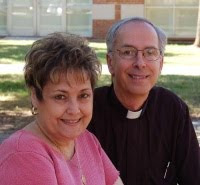At home with Mary and Joseph our Lord Jesus received the first proclamation of faith:
 "The Christian home is the place where
children receive the first proclamation of the faith. For this reason
the family home is rightly called 'the domestic church,' a community of
grace and prayer, a school of human virtues and of Christian charity." (CCC 1666)
"The Christian home is the place where
children receive the first proclamation of the faith. For this reason
the family home is rightly called 'the domestic church,' a community of
grace and prayer, a school of human virtues and of Christian charity." (CCC 1666) Mary and Joseph educated the Lord Jesus in the life of prayer by word and example:
"The Christian family is the first place of education in prayer. Based on the sacrament of marriage, the family is the "domestic church" where God's children learn to pray "as the Church" and to persevere in prayer. For young children in particular, daily family prayer is the first witness of the Church's living memory as awakened patiently by the Holy Spirit." (CCC 2685)
Jesus, Mary and Joseph were joined in the virtues of faith, hope and charity:
"The Christian family constitutes a specific revelation and realization of ecclesial communion, and for this reason it can and should be called a domestic church." It is a community of faith, hope, and charity; it assumes singular importance in the Church, as is evident in the New Testament. (CCC 2204)
No one is excluded from the holiness of life to which all of our families are called. Everyone lives with the "horizon of the family" as Saint John Paul II taught:
"We must also remember the great number of single persons who, because of the particular circumstances in which they have to live - often not of their choosing - are especially close to Jesus' heart and therefore deserve the special affection and active solicitude of the Church, especially of pastors. Many remain without a human family often due to conditions of poverty. Some live their situation in the spirit of the Beatitudes, serving God and neighbor in exemplary fashion. The doors of homes, the 'domestic churches,' and of the great family which is the Church must be open to all of them. 'No one is without a family in this world: the Church is a home and family for everyone, especially those who 'labor and are heavy laden.''" (CCC 1658)
May every family learn from and imitate the first Holy Family of Jesus, Mary and Joseph. Just as Jesus Christ Incarnate was at the heart of the Holy Family of Nazareth, so may Jesus Christ in the Eucharist also be at the heart of every family today, called to be a new holy family.
(Image: Holy Family at Sagrada Famiglia Church by Antonio Gaudi, Barcelona)




